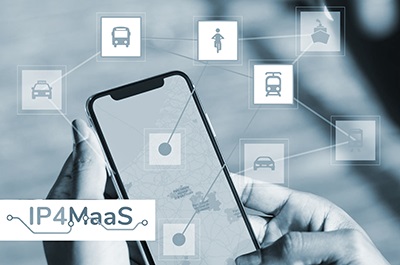
The Department of Mechanical Engineering is one of the partners of the IP4MaaS project, which is funded by the Shift2Rail Joint Undertaking, and in particular its Innovation Programme 4 (IP4), as part of the Horizon 2020 Programme.
Over the years, Shift2Rail IP4 has funded more than 10 projects, which have developed a wide array of digital services that aim to make the traveler’s experience a seamless one. The technologies developed within IP4 cover all aspects of the travel experience, such as the shopping of travel offers, their booking, the emission and validation of tickets, and the real-time monitoring of trips. In addition, IP4 has defined an innovative framework that facilitates the interoperability of Transport Service Providers’ (TSPs) services.
The ecosystem of services developed within Shift2Rail IP4 enables the new mobility paradigm known as Mobility as a Service (MaaS), where different public and private transportation services are seamlessly integrated by Information Technologies.
The IP4MaaS project aims to advance the uptake of MaaS schemes by supporting, facilitating and evaluating the demonstration of the digital services developed within Shift2Rail IP4. The demonstrations will be carried out in 6 sites distributed across Europe, and will involve more than 10 transport operators, authorities and agencies. The work carried out in IP4Maas contributes to the creation of a digital ecosystem for door-to door travel in a seamless, multimodal and European-wide transport system based on the railways.
IP4MaaS is developing the demonstrations’ scenarios and a thorough assessment strategy that tackles both the performance of the demonstrations as well as the impact of the technologies on users and on the transport environment in urban and suburban contexts. The project will provide recommendations regarding the promotion and transferability of the technologies to other locations in Europe.
IP4MaaS is organizing one of the largest demonstrations of technologies in European projects’ history and expects its findings to be used as a baseline for future demonstrations that involve a large and diverse group of partners.
The IP4MaaS project started in December 2020, and will end in April 2023. The demonstrations will be run in two rounds. A first round of demonstrations will be carried out during the summer of 2022, while a second round is planned for early 2023.
Within IP4MaaS, Politecnico di Milano’s research unit leads the workpackage focusing on:
- the analysis of the existing digital services that are available in the 6 demonstration sites
- the definition of the needs and expectations of users (both travelers and TSPs)
- the definition of the scenarios to be demonstrated.
In addition, it leads the activities regarding the monitoring of the ongoing integration of the services provided by IP4MaaS TSPs into the Shift2Rail IP4 ecosystem.
The research activities carried out by Politecnico di Milano’s team, within IP4MaaS, are coordinated by Prof. Matteo Giovanni Rossi, DMEC. He has also coordinated Politecnico’s teams that have contributed to several projects carried out within Shift2Rail IP4, which have developed some of the technologies that will be demonstrated within IP4MaaS. Politecnico’s researchers have collaborated to the definition and realization of the framework facilitating the interoperability of services provided by TSPs.
They have also developed several services that support travelers during various phases of their travel experience. More precisely, they have realized mechanisms to, on one side, analyze the choices made by travelers when deciding what travel solutions to buy (i.e., in the shopping phase) and, on the other side, automatically learn their preferences and use this information to help them select the offers that best fit them. In addition, they have contributed to the creation of a system that enables and integrates ride sharing (one of the new mobility paradigms that are part of the MaaS concept) in the context of multi-modal trips. In particular, they have developed mechanisms to monitor the execution of rides, and the detection of disruptions (e.g., delays) that can negatively impact the whole trip.
